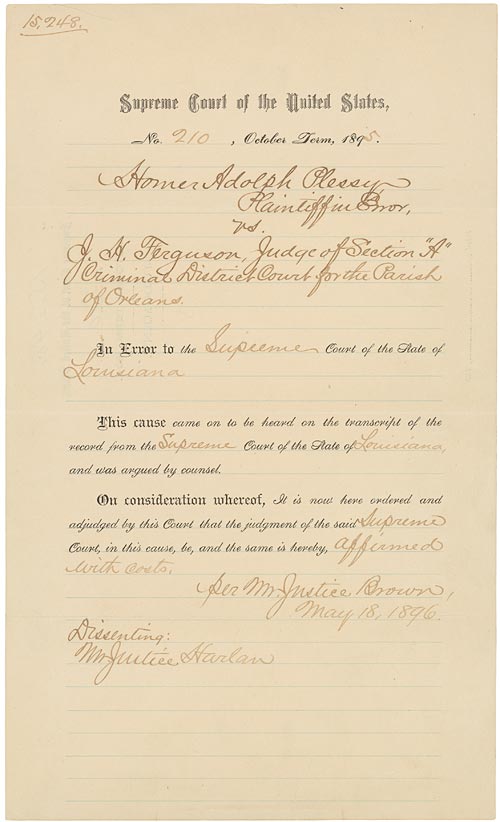Welcome to DU!
The truly grassroots left-of-center political community where regular people, not algorithms, drive the discussions and set the standards.
Join the community:
Create a free account
Support DU (and get rid of ads!):
Become a Star Member
Latest Breaking News
Editorials & Other Articles
General Discussion
The DU Lounge
All Forums
Issue Forums
Culture Forums
Alliance Forums
Region Forums
Support Forums
Help & Search
American History
Related: About this forumMay 18, 1896: Plessy v. Ferguson
https://www.archives.gov/milestone-documents/plessy-v-ferguson
Citation: Plessy vs. Ferguson, Judgement, Decided May 18, 1896; Records of the Supreme Court of the United States; Record Group 267; Plessy v. Ferguson, 163, #15248, National Archives.
The ruling in this Supreme Court case upheld a Louisiana state law that allowed for "equal but separate accommodations for the white and colored races."
[...]
In 1891, a group of concerned young Black men of New Orleans formed the “Citizens’ Committee to Test the Constitutionality of the Separate Car Law.” They raised money and engaged Albion W. Tourgée, a prominent Radical Republican author and politician, as their lawyer. On May 15, 1892, the Louisiana State Supreme Court decided in favor of the Pullman Company’s claim that the law was unconstitutional as it applied to interstate travel. Encouraged, the committee decided to press a test case on intrastate travel. With the cooperation of the East Louisiana Railroad, on June 7, 1892, Homer Plessy, a mulatto (7/8 white), seated himself in a white compartment, was challenged by the conductor, and was arrested and charged with violating the state law. In the Criminal District Court for the Parish of Orleans, Tourgée argued that the law requiring “separate but equal accommodations” was unconstitutional. When Judge John H. Ferguson ruled against him, Plessy applied to the State Supreme Court for a writ of prohibition and certiorari. Although the court upheld the state law, it granted Plessy’s petition for a writ of error that would enable him to appeal the case to the Supreme Court.
In 1896, the Supreme Court issued its decision in Plessy v. Ferguson. Justice Henry Brown of Michigan delivered the majority opinion, which sustained the constitutionality of Louisiana’s Jim Crow law. In part, he said:
We consider the underlying fallacy of the plaintiff’s argument to consist in the assumption that the enforced separation of the two races stamps the colored race with a badge of inferiority. If this be so, it is not by reason of anything found in the act, but solely because the colored race chooses to put that construction upon it… The argument also assumes that social prejudice may be overcome by legislation, and that equal rights cannot be secured except by an enforced commingling of the two races… If the civil and political rights of both races be equal, one cannot be inferior to the other civilly or politically. If one race be inferior to the other socially, the Constitution of the United States cannot put them upon the same plane.
In the lone dissent, Kentuckian Justice John Marshall Harlan wrote:
I am of the opinion that the statute of Louisiana is inconsistent with the personal liberties of citizens, white and black, in that State, and hostile to both the spirit and the letter of the Constitution of the United States. If laws of like character should be enacted in the several States of the Union, the effect would be in the highest degree mischievous. Slavery as an institution tolerated by law would, it is true, have disappeared from our country, but there would remain a power in the States, by sinister legislation, to interfere with the blessings of freedom; to regulate civil rights common to all citizens, upon the basis of race; and to place in a condition of legal inferiority a large body of American citizens, now constituting a part of the political community, called the people of the United States, for whom and by whom, through representatives, our government is administrated. Such a system is inconsistent with the guarantee given by the Constitution to each State of a republican form of government, and may be stricken down by congressional action, or by the courts in the discharge of their solemn duty to maintain the supreme law of the land, anything in the Constitution or laws of any State to the contrary notwithstanding.
[...]
2 replies
 = new reply since forum marked as read
Highlight:
NoneDon't highlight anything
5 newestHighlight 5 most recent replies
= new reply since forum marked as read
Highlight:
NoneDon't highlight anything
5 newestHighlight 5 most recent replies
May 18, 1896: Plessy v. Ferguson (Original Post)
sl8
May 2024
OP
NNadir
(35,010 posts)1. The second worst decision of the Supremes after Dred Scott, matched perhaps by the religious political hacks there now.
The Dobbs decision declared women's internal organs state property.
MichMan
(13,928 posts)2. Along with Korematsu v. United States
Allowing FDR to lock up Japanese Americans in internment camps during WWII